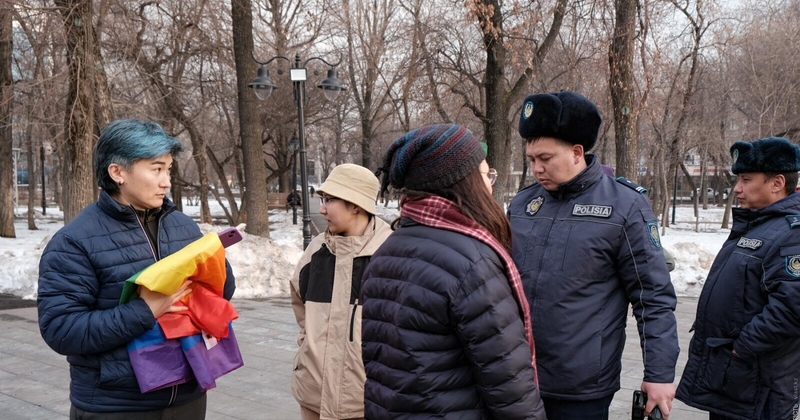Listen to the article
Lawmakers in Kazakhstan have moved forward with controversial legislation that equates information about LGBTQ+ identities with harmful content like pornography and violence, drawing criticism from rights activists who were largely excluded from the amendment process.
At a recent parliamentary working group meeting, members approved amendments to the law on children’s rights that would prohibit the “promotion of non-traditional sexual orientations and pedophilia” through mass media, literature, entertainment, and other channels. The legislation places information about LGBTQ+ people in the same category as content promoting violence, cruelty, and material that “offends human dignity.”
Significantly, the amendments introduce a formal definition of “LGBT propaganda” into Kazakhstan’s legal framework for the first time. The new definition describes it as “the dissemination of information about a non-traditional sexual orientation and adherence to it, performed in public or via mass media, telecommunications, or online platforms, including deliberately distorted information intended to convince an unspecified group to form a positive public opinion of said practices.”
The legislative changes extend beyond the children’s rights law, with identical standards set to be implemented across multiple sectors including communication, culture, education, cinematography, online platforms, and advertising, suggesting a broad restriction on LGBTQ+ visibility throughout Kazakhstani society.
During the meeting, tensions emerged between lawmakers and civil society representatives. Boris Kruglov, identified as a legal consultant, argued for the need to address what he termed an aggressive “LGBT lobby” through separate legislation that would close potential “loopholes” in the current amendments.
The proceedings were marked by a lack of transparency, as highlighted when one activist, identified only as Chernobyl, expressed confusion about which specific amendments were under discussion, noting “there was no text anywhere.” The meeting’s moderator, Beisenbayev, responded that since she was not an official member of the working group, she was not permitted to view the text being discussed.
In a revealing moment of procedural maneuvering, Beisenbayev acknowledged that activists were only invited to the session to prevent future questions about their exclusion from the process, rather than to facilitate their meaningful participation in the legislative deliberations.
The amendments were unanimously approved by the working group members and now move to the Majilis (lower house of parliament) plenary session. If passed there, the bill will proceed to the Senate for further consideration.
This legislative development in Kazakhstan follows similar moves in neighboring Russia, which has progressively expanded its laws against “LGBT propaganda” since 2013. The trend represents part of a broader regional pattern of increasing restrictions on LGBTQ+ rights and visibility across several post-Soviet states.
Human rights organizations have consistently raised concerns about such legislation, arguing that laws equating information about LGBTQ+ identities with harmful content can lead to increased discrimination, violence, and mental health challenges for already vulnerable populations.
For Kazakhstan, a nation that has sought to position itself as a modernizing force in Central Asia with stronger ties to both East and West, these amendments may draw international scrutiny and potentially impact diplomatic and economic relationships with Western nations that have increasingly tied human rights standards to trade and cooperation agreements.
The bill’s advancement comes amid a period of political transition in Kazakhstan following the long presidency of Nursultan Nazarbayev, with current President Kassym-Jomart Tokayev navigating between traditional social values and modernization efforts in the resource-rich nation of nearly 19 million people.
Fact Checker
Verify the accuracy of this article using The Disinformation Commission analysis and real-time sources.




10 Comments
Concerning legislation that limits free speech and expression. While public morality and child protection are important, equating LGBTQ+ content with harmful material like violence is highly problematic. Balanced, factual discourse should be the goal, not censorship.
This legislation seems to go too far in restricting information and discussion about LGBTQ+ identities. Promoting understanding and tolerance should be the priority, not categorizing it as propaganda. I hope Kazakhstan reconsiders this controversial approach.
You raise a fair point. Banning all LGBTQ+ content outright is heavy-handed and could backfire. Thoughtful policies that protect minors while allowing open dialogue are needed.
This is a troubling development that appears to conflate LGBTQ+ identities with harmful content like violence and pedophilia. Restricting factual, balanced discourse on these topics is a worrying step backwards for Kazakhstan.
Kazakhstan is taking a hardline stance on LGBTQ+ issues with this new legislation. While national values and traditions are important, this seems like an overly broad and potentially discriminatory approach that could violate human rights.
I agree. Framing LGBTQ+ content as propaganda is concerning. There needs to be room for factual, respectful discussion, even if the government has reservations about certain lifestyles or identities.
This appears to be a concerning development that could stifle open discourse and understanding around LGBTQ+ issues in Kazakhstan. Protecting children is important, but equating this with ‘propaganda’ is problematic.
Completely agree. Censorship and repression are rarely the answer. Promoting tolerance and allowing people to make their own informed decisions would be a wiser approach.
While I understand the intent to uphold traditional values, this legislation seems overly broad and restrictive. Banning all LGBTQ+ content as ‘propaganda’ is a concerning infringement on free expression and human rights.
I share your concerns. This type of blanket ban on LGBTQ+ information and discussion could backfire and breed more intolerance rather than addressing the underlying issues constructively.